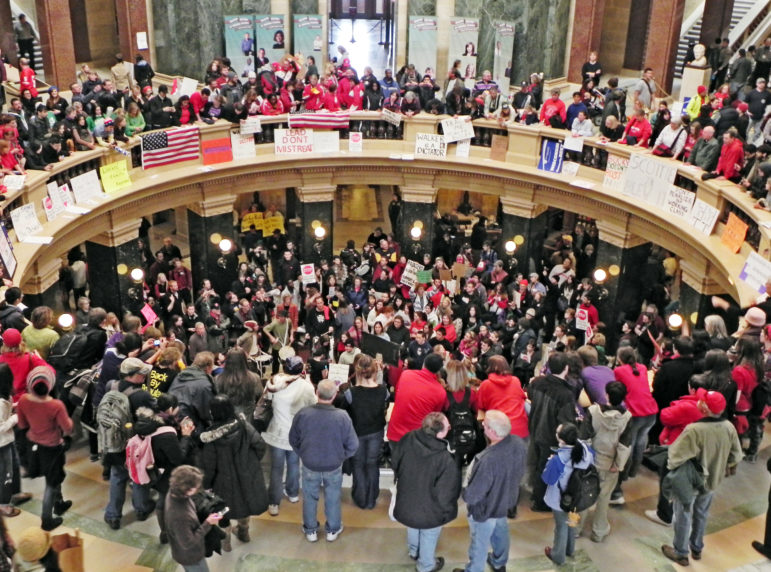State Has Nation’s Largest Dip in Union Members
Dropping from 18% of state’s workers to 8% in two decades, new report finds.

Thousands of demonstrators flood Wisconsin’s Capitol building on March 9, 2011, to protest the Senate passage of the Wisconsin budget repair bill, later known as Act 10. The bill stripped collective bargaining rights from most public sector employees and prompted the recall of several state senators, including the unsuccessful recall of Gov. Scott Walker. The bill was fast-tracked through the Legislature, passing in just 24 days. One in every four bills passed during the 2011-12 session were fast-tracked, a Wisconsin Center for Investigative Journalism analysis found. Photo by Richard Hurd. (CC BY 2.0)
Wisconsin experienced the largest drop in workforce union membership of any state since the start of the century, according to a Wisconsin Policy Forum report released Tuesday. The shift represents sweeping changes in the private and public sectors.
According to the report, 17.8 percent of employed Wisconsin workers were part of a union in 2000. By 2021, that number fell to 7.9 percent.
The state’s 9.9 percent drop was the largest in the country, beating the national average of a 3.1 percent loss.
Ari Brown is a senior research associate with the nonpartisan Wisconsin Policy Forum. He said one explanation is a decline in manufacturing and construction jobs.
“Over the course of decades, but especially over the last couple of decades, those jobs have really started to go away,” Brown said.
Brown said Act 10 also created significant changes for unions.
“There has not been something on the level of Act 10 really anywhere in the country,” Brown said. “It’s very likely a contributor to the very steep decline in public sector union concentration you see in Wisconsin.”
“Wisconsin has really been a leader with unions in general, both in terms of building them up and then curtailing them,” Brown said.
Among other changes, Act 10 established requirements for yearly recertification for most public sector unions to remain recognized by state and local government. According to the report, 983 public sector unions in Wisconsin took a recertification vote between November 2011 and the end of 2021. Of those, 318 passed.
Brown said the requirement that 51 percent of all union members vote in favor of recertification has made the process even more laborious.
“If you have a large union, and for whatever reason, not everyone was voting, it’s gonna be really, really difficult to annually recertify,” Brown said.
Brown said Act 10 brought the political aspects of unions into focus.
“On the right, you have the decline in unions, that it’s kind of welcomed as a win, especially for taxpayers,” Brown said. “The left would kind of argue, you know, it’s a really big blow to workers, it’s a blow to income inequality, especially when you’re talking about the public sector.”
Brown noted generally, low unemployment rates and challenges in hiring have given employees more leverage for starting unions and negotiating contracts. He pointed to efforts on the part of Colectivo Coffee workers to unionize, a campaign that remains ongoing. Some Wisconsin Starbucks locations have also pushed for unionizing.
“There’s been so much of this discussion very recently about unionization, because we’re in such a hot labor market right now,” Brown said. “A lot of this conversation does come down to wages, but it also does come down to things like work rules.”
Brown said the extent to which the drive for unionization continues in the future will also depend on factors like inflation, wage increases, immigration and retirement.
Listen to the WPR report here.
Report: Act 10, manufacturing declines contributed to drop in Wisconsin union membership was originally published by Wisconsin Public Radio.
More about the ACT 10
- Susan Crawford Attempted to Overturn Act 10 - Brad Schimel - Feb 26th, 2025
- Despite Act 10, Union Argues UW Health Nurses Can Collectively Bargain - Rich Kremer - Feb 13th, 2025
- Protasiewicz Says She Won’t Recuse From Act 10 Case - Anya van Wagtendonk - Feb 13th, 2025
- Unions: We Remain Confident in Merits of Our Case - Wisconsin Education Association Council - Feb 12th, 2025
- Supreme Court Justice Brian Hagedorn Recuses Himself From Act 10 Challenge - Rich Kremer - Jan 31st, 2025
- Republicans Push Justice Protasiewicz to Recuse From Act 10 Case - Anya van Wagtendonk - Jan 29th, 2025
- Ruling That Struck Down Act 10 Put on Hold - Rich Kremer - Dec 20th, 2024
- Data Wonk: Did Act 10 Improve Wisconsin’s Economy? - Bruce Thompson - Dec 12th, 2024
- Op Ed: Republicans Behind the Times on Act 10 - Ruth Conniff - Dec 11th, 2024
- Murphy’s Law: Act 10 Ruling Could Be Tough to Overturn - Bruce Murphy - Dec 9th, 2024
Read more about ACT 10 here






















I am proud to point out that my union, the Milwaukee Teachers Education Association, has successfully re-certified every year since 2012, despite the barriers erected by Act 10. Unions and locals that either lost re-cert elections or didn’t even try lacked militant leadership and an engaged membership. This was the result of years of flabby, “business unionism” that never took educating and engaging their membership seriously. Wisconsin has a glorious history of militant, determined labor organizing and we can- no we MUST- return to those days of the Bay View martyrs and the Kohler strikers. Anyone notice that the rise of the extreme right in Wisconsin parallels the decline of union membership?